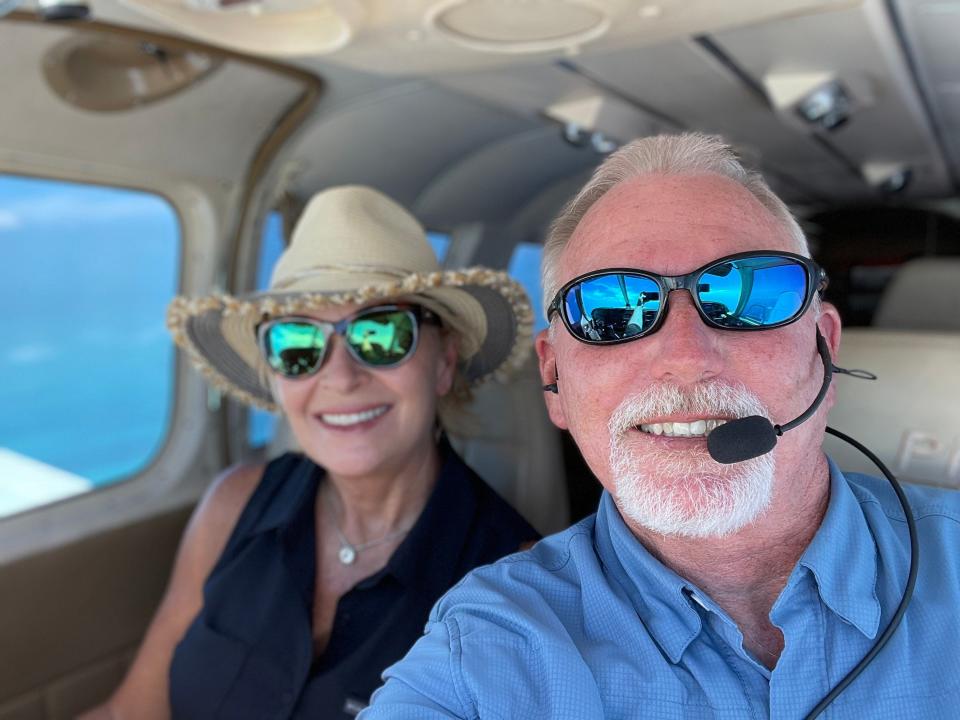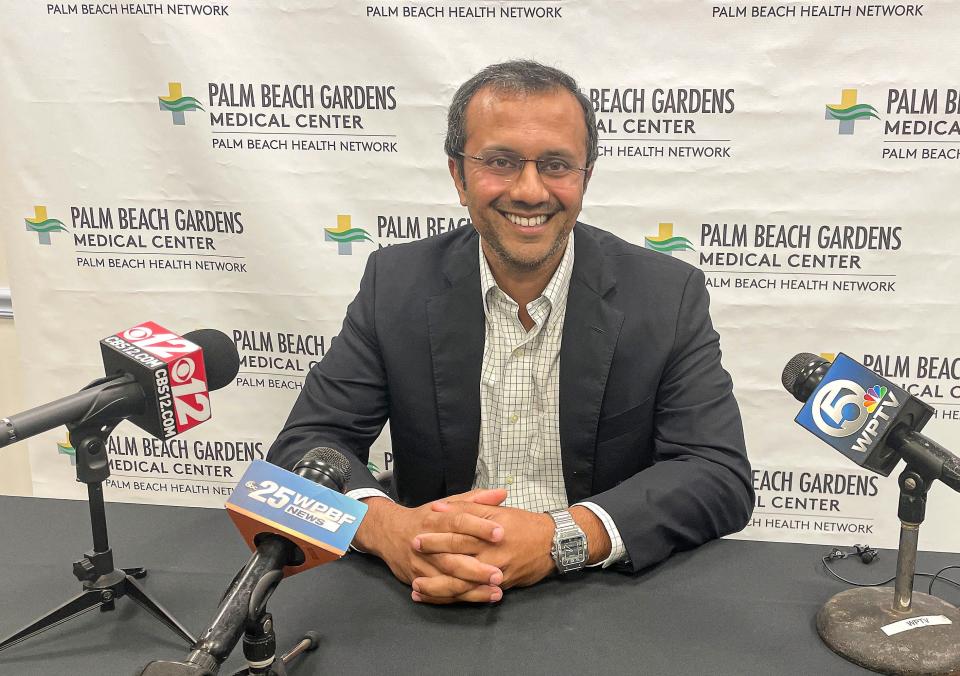Emergency landing in Florida: Pilot who lost consciousness in mid-air suffered aortic tear
PALM BEACH GARDENS — A 64-year-old pilot who lost consciousness in mid-air, leaving his passengers with no flight experience to land the plane, suffered a tear in his heart's main artery, according to the doctor who brought him into emergency surgery at Palm Beach Gardens Medical Center.
Kenneth Allen of Lake Wales was released from the hospital Monday, six days after the emergency landing at Palm Beach International Airport. The grandfather of six will recover locally for about three weeks before returning home.
Dr. Nishant Patel, a cardiothoracic surgeon at Palm Beach Gardens Medical Center, said he's optimistic about Allen's recovery.

The tear, called an aortic dissection, occurs in the inner layer of the body's main artery.
Blood rushes through the tear, causing the inner and middle layers of the aorta to split. If the blood goes through the outside aortic wall, an aortic dissection is often deadly, according to The Mayo Clinic's website.
In short, Allen is lucky to be alive.
"Every step of the way, it was really extraordinary that he was able to get through it," Patel said. "The first thing he said to me the morning after surgery was, 'When can I go home?' "
About the 'miracle' landing: 'I felt like I was in a movie': Jupiter air traffic controller helps passenger land plane at PBIA
In-depth look: 76 minutes of suspense: How an air traffic controller's calm guidance helped avoid a disaster
Florida Man: Passenger who landed plane - in flip-flops and shorts - was returning from fishing trip
Pilot had headache before he passed out on plane from Bahamas
On May 10, Allen briefly complained of a headache before he became incapacitated aboard a Cessna 208 Grand Caravan plane that was headed to Treasure Coast International Airport near Fort Pierce from The Bahamas.
Patel said this was likely the exact moment when the tear in the inner layer of his aorta occurred.
Darren Harrison of Lakeland was on board the nine-seater with another passenger when it went into a nosedive.
He took control of the plane and radioed the Fort Pierce air traffic control tower, scrambling to figure out what to do next.
In a now near-famous interaction, Harrison said, "I've got a serious situation here. My pilot has gone incoherent. I have no idea how to fly the airplane," at about 11:21 a.m.

Chip Flores, the air traffic controller who answered Harrison's call, helped him keep the plane in the air while a cohort of operations managers tried to locate it.
The Fort Pierce controllers eventually transferred Harrison to the Palm Beach International Airport air-traffic control tower once they located the plane near Boca Raton.
Bobby Morgan, a flight instructor and Jupiter Farms resident, directed Harrison to the airport and helped him land safely at 12:37 p.m.
“We’ve never had anything like that. … I felt like I was in a movie,” Morgan told the FAA. “Everybody wanted to participate and came out of the offices to assist in any kind of way.”
An ambulance was waiting for Allen, who Patel said was "confused and lethargic."
Dr. Nishant Patel discusses the 9-hour surgery he did that saved the life of the pilot who was incapacitated last week mid-flight from the Bahamas.
Passengers on the plane took control and landed at PBIA. The pilot, 64-year-old Kenneth Allen, had a tear in his aorta. pic.twitter.com/vT8qZgEbei— Kati Kokal (@katikokal) May 19, 2022
At first, he was taken to St. Mary’s Medical Center in West Palm Beach, where emergency doctors reviewed his symptoms that appeared similar to those of a person having a stroke: The left side of his face was drooping and he wasn't moving that side of his body.
But a CT scan of his neck and upper chest showed a type A dissection, and doctors at St. Mary's called Palm Beach Gardens Medical Center, which has a heart and vascular care center, to transfer him there.
Patel said Allen arrived at mid-afternoon to the hospital and could give doctors his wife's name, Stanna, and her phone number. He went into surgery in the late afternoon.
To repair the torn aorta, Patel and his team had to stop the blood flow in Allen's body to every organ except his brain. That meant cooling his body temperature to 20 degrees in order to replace the ascending part of the aorta.
Surgeons completed their work about midnight, and Patel said Allen had no issues with excessive bleeding during or after the surgery.
"When you cool someone down that low, the clock is ticking," Patel said. Even the slightest change in blood flow to the brain increases risks of neurological damage.

Pilots over 40 must renew medical certification every 6-12 months
Allen's ordeal may spell the end of his piloting career.
The Federal Aviation Administration requires that pilots receive and maintain a medical certificate before flying solo in an airplane.
The medical certificate must be completed by an FAA-approved medical examiner, and the exam includes identifying medical conditions that may either disqualify someone from being a pilot or require the pilot have certain limitations.
According to the FAA, medical conditions that can disqualify pilots include heart disease, substance abuse or dependency and epilepsy.
Pilots who have cardiac valve replacements can be denied or deferred in the medical certification process.
Pilots who do not meet medical standards may qualify for certain exemptions, according to the FAA.
Depending on the class of their pilot's license, pilots over 40 years old must renew their medical certificate every six months, every 12 months, or every 2 years.
Allen's aortic dissection and replacement likely will impact his flying abilities, although Patel said he is recovering well and it will be up to the FAA whether he can fly again.
Katherine Kokal is a journalist covering northern Palm Beach County at The Palm Beach Post. You can reach her at kkokal@pbpost.com. Help support our work, subscribe today!
This article originally appeared on Palm Beach Post: Passenger lands plane in Florida. What happened to the pilot?

